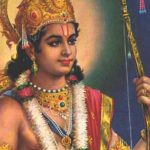Lakshmana was the younger half-brother of Rama by the third and youngest wife of King Dasiaratha of Ayodhya. But his affection for Rama was understood to have been the result of his previous lifetime—as an incarnation of Lord Vishnu’s serpent, the one who floated as his bed on the cosmic ocean, Ananta (also called Sesha). Lakshmana could even be counted as a one-eighth incarnation of Vishnu. Lakshmana was the archetype of brotherly devotion, an example of pure human love and devotion (bhakti).
Lakshmana married Urmila, with whom he had two sons. He left them behind in Ayodhya and followed Rama and Sita into their forest exile of fourteen years. Lakshmana was heroic and loyal to Rama in every way. When a rakshasi (female night-wandering demon) named Surpanakha found Rama very attractive and wanted him as her husband, Rama rejected her. Furious she attacked the brothers, and Rama ordered Lakshmana to disfigure her. Lakshmana cut off her breasts and nose. Another account said that it was her nose and ears. Surpanakha went straight to her three brothers, who swore they would avenge her mutilation. The giant rakshasas led an army of fourteen thousand against Rama and Lakshmana and engaged them in a furious battle. However, the human brothers killed every one of them. Then Surpanakha told her really big brother, Ravana, and the war of revenge began with Sita’s abduction to Ravana’s kingdom in Lanka.
After helping Rama defeat Ravana and all his forces and returning to Ayod- hya, Lakshmana continued to help with Rama’s divine rule. However, the purpose for the incarnation had been completed, and Yama (the god of death, also called Kala, time) came disguised as a brahmin. He demanded a private and uninterrupted audience with Rama. Rama assigned Lakshmana the task of keeping all out on pain of banishment. Old, meddlesome Durvasa arrived and ordered Lakshmana to let him see the king immediately or he would curse Rama with the worst of calamities. Knowing that he would have to be banished for breaking what had been Rama’s royal command, Lakshmana burst in and forced Rama to placate Durvasa. Rama escaped Durvasa’s curse, but Lakshmana was forced into exile.
The ending of this incarnation had a stark version and a pleasant one. In one account, Rama became depressed without his brother. Rama ended his life by drowning in the Sarayu River at Gotara and returned to Vishnu (Vaikuntha in one account; Vishnupada (“Vishnu’s feet”) in another; some see them as the same). Lakshmana heard of Rama’s death and drowned himself at the same place in the river. Another version stated that Lakshmana retired to the banks of the Sarayu River and practiced penance there. The gods showered flowers on him and transported him bodily to heaven—thus avoiding the problem of suicide.

